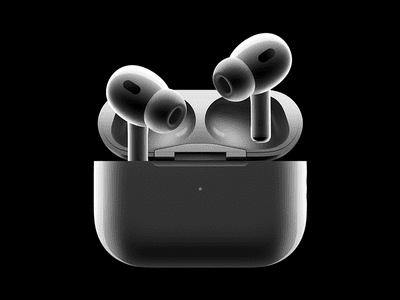
Evaluating the Logitech Casamania Pop Up Desk: Outstanding Keyboard and Trackpad Performance Overshadowed by Inferior Case Design

Evaluating the Logitech Casamania Pop Up Desk: Outstanding Keyboard and Trackpad Performance Overshadowed by Inferior Case Design
Key Takeaways
- Logitech Casa Pop-Up Desk offers a slick workspace with a responsive keyboard and smooth trackpad.
- Multi-device support and wide compatibility make this setup workable for various operating systems.
- The case stand may not bring much value for the overall price, but the keyboard and touchpad provide a solid experience.
Whether people are clamoring for a keyboard, touchpad, and laptop stand combo that packs away in a folio case is debatable. Still, the Logitech Casa Pop-Up Desk is a slick solution for anyone with that exact need who wants to move around the house.
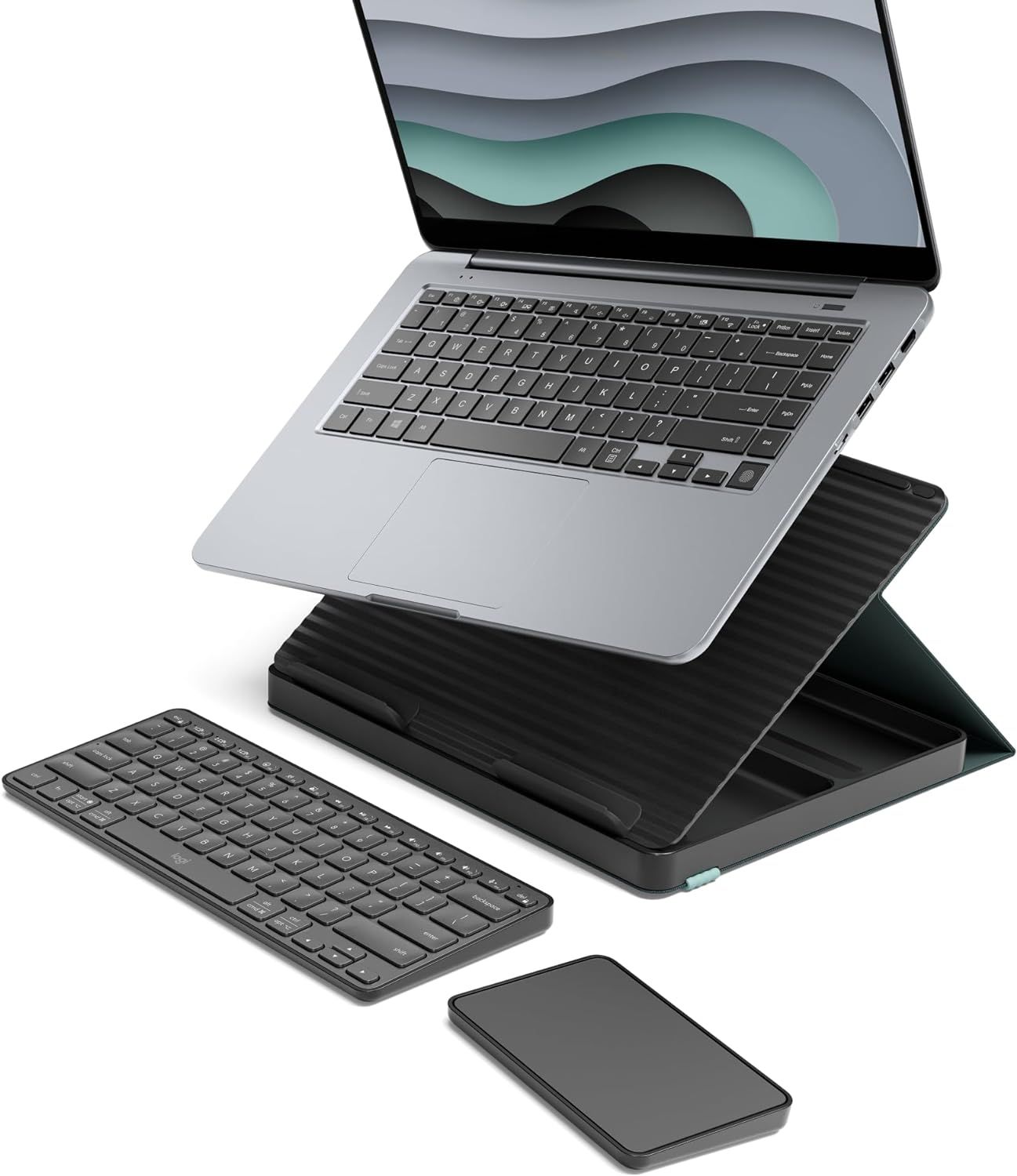
Logitech Casa Pop-Up Desk
6/ 10
$160 $180 Save $20
This all-in-one, ergonomic workspace includes a minimalist keyboard, intuitive wireless touchpad and convenient storage compartment nestled in a book-like case that transforms into a sturdy, foldaway laptop stand.
Pros
- Responsive keyboard
- Smooth trackpad
- Multi-device support
Cons
- Stand didn?t bring much to the table for overall value
- Whole package isn?t very travel-friendly
$160 at Amazon $179.99 at Logitech
Price and Availability
This all-in-one work-from-home comes in three colors and retails for $179.99.
Specifications
Connectivity
Bluetooth
Keyboard Battery
5 months
Mouse Battery
3 weeks
A Laptop or iPad Work Station
If the Casa Pop-Up Desk was just geared towards any single operating system, I don’t think it would be as appealing. But its compatibility across mobile and desktop systems, from iPadOS to Windows, makes it more valuable for a wide range of uses.
It’s not surprising that Logitech employs wide compatibility since most of the company’s other products usually work across multiple platforms. The Casa Pop-Up Desk is essentially a packaging of the Casa Keys keyboard and the Casa Touch touchpad in a clever case (Casa Book). My big hope is that we see these devices sold independently at some point.
The Feel of Casa Keys and Casa Touch
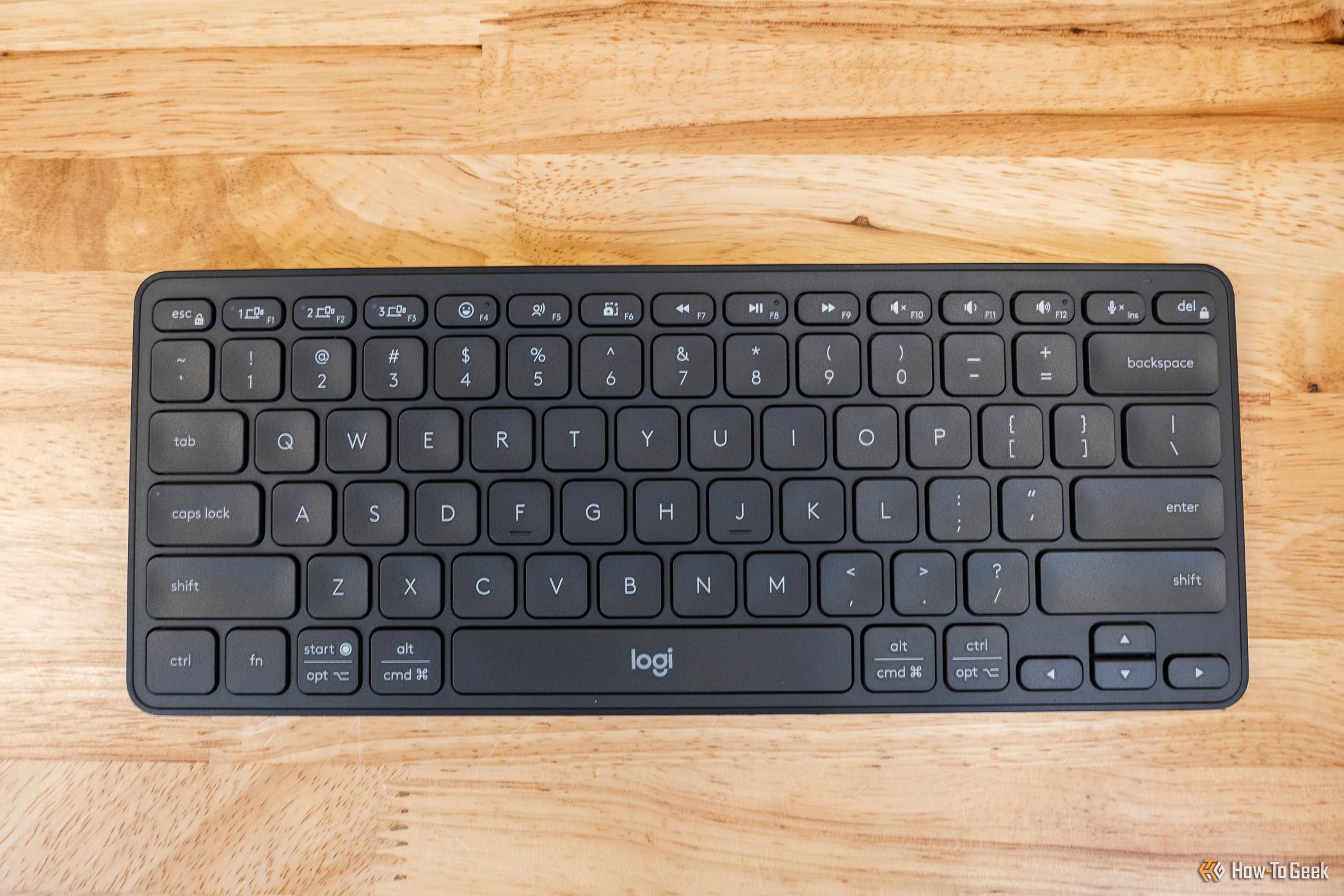
Jerome Thomas / How-To Geek
For someone who tests and tries out a lot of keyboards, I was immediately impressed by the feel and response of the Casa Keys. It’s not a mechanical keyboard nor does it have the thinness of Apple’s Magic Keyboard but it isn’t too far off from the experience of the latter.
The keys sink into the plastic frame, more than they protrude from it, and are a tiny bit smaller than the Magic Keyboard, but otherwise, I didn’t have a problem moving from Apple’s typing device to Logitech’s.
In fact, I came to really enjoy using the Casa Keys. After a few days, the only things I didn’t like about it were minor qualms with the look and layout, rather than anything functional. I could have done without the combined alt and cmd keys. The merged function row and media controls always looked crowded when glancing at it. And that “logi” logo on the spacebar is a travesty.
In Logitech’s lineup the Casa Keys sits somewhere between the Pebble Keys 2 and the MX Keys Mini, although much closer to the Pebble side. Despite The Casa Keys keyboard being thin and compact, it still has a bit of heft to it making it feel firm and sturdy. There’s also five months of battery life packed into its frame.
Under my right hand, the Casa Touch performed much better than expected even though it still had its issues. I had low expectations going in since Apple’s bar for a good touchpad is so high. It’s the multitouch gestures and unwanted touch avoidance that makes Apple’s input devices so good.
On the Casa Touch side, it’s big enough to be usable, but not so big that it feels unwieldy. It had plenty of room to slide my fingers around. Its clicks were mostly satisfying and its touch surface was responsive enough not to be a constant source of frustration. The biggest area of trouble was the gestures like selecting text, by clicking and dragging. I could get it to work, but the results were usually split fifty-fifty on whether I could get it to work the first time without thinking about it.
I also had the occasional unregistered touch where the cursor would jump to a different part of the screen, but that was only once or twice and uncommon enough to mostly ignore. Unlike the Casa Keys’ long battery life, the Touch only gets about 3 weeks of power before needing to recharge it. I didn’t mind that.
Software Is a (Small) Factor
While you can get away without using the Logi Options+ software for the keyboard, it’s pretty much a necessity for the Touch. The app allows customization of gestures, cursor speed, and all kinds of other fiddly details.
At the tail end of my testing, Logitech released an update for its app that added AI options , so you can customize a key to open ChatGPT, for example. I didn’t feel the need to use either of those options. Instead, I customized the dictation button on the Keys to launch the MLB app on my Mac, but other than that, I liked all the pre-set media controls and even the emoji button looming over the F4 key. Customizing the trackpad was another story. I felt like I needed to tweak more on that device to get it to my liking when using it with my Mac—turning on and off gestures to match my needs. But to Logitech’s credit, I was able to get it really close to my preferred feel.
The software goes much further than just changing how a device works. There’s Flow and Smart Actions too. Flow will allow for multi-device use, like copying and pasting between Mac and Windows computers. I didn’t have a need for this and I question how many people will use it in practice. I’m guessing it’s for people with personal and work devices that don’t use the same operating system.
Smart Actions allows multiple apps and tasks to be launched at once. Basically, it does macros. This feels like a more practical need for more people, but I still didn’t find too many instances where I wanted to have 12 items fire off for me at the press of a button. Maybe I’m less imaginative in this area. It’s neat and it worked, but I wouldn’t buy a Logitech product for this feature.
How Much Is the Case Worth?
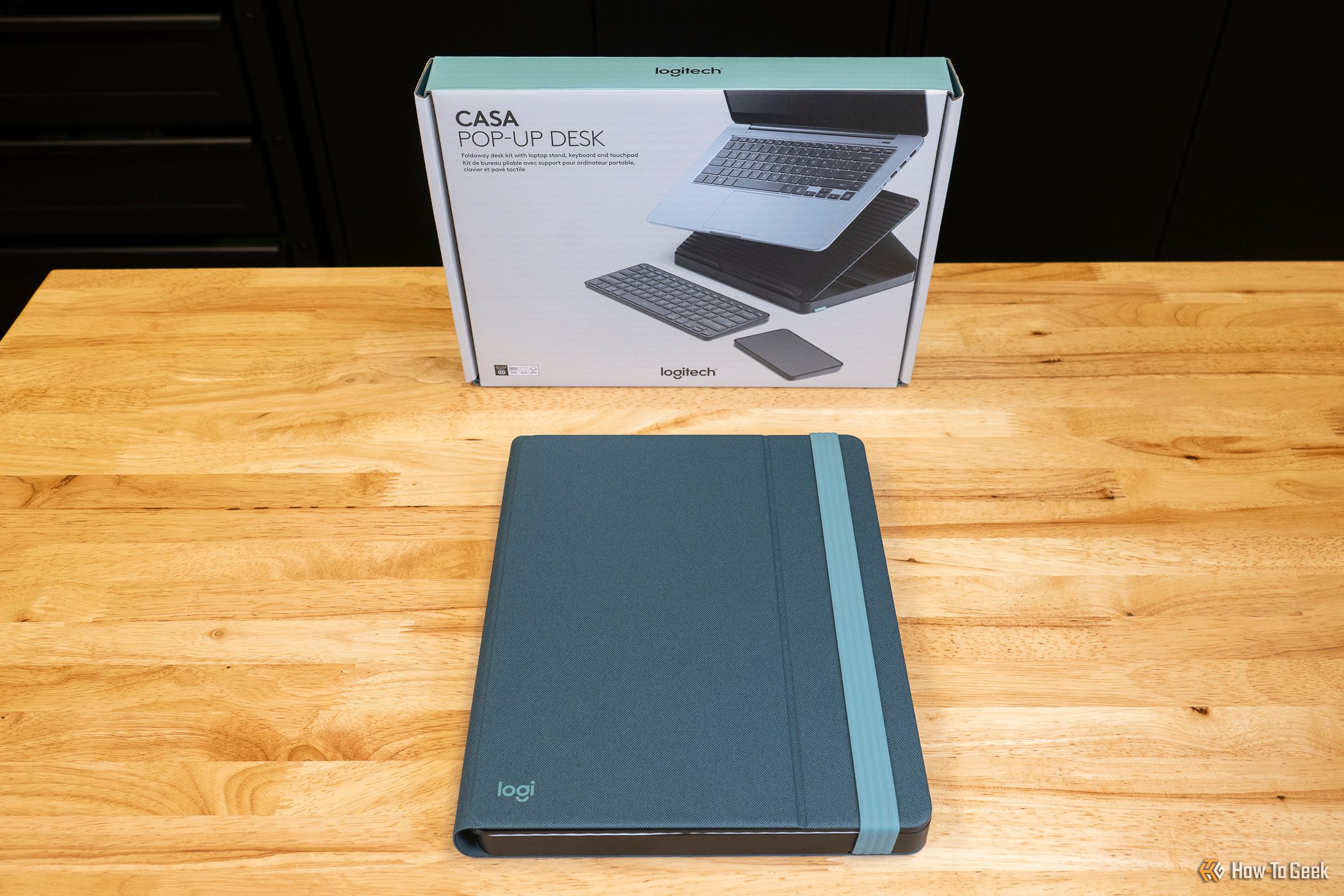
Jerome Thomas / How-To Geek
Interestingly, I found that the case stand was the weakest part of this combo. While the keyboard or touchpad not being up to snuff would mostly render the whole product moot, the stand being less than ideal makes things more complicated.
First, using the case as a stand takes up a lot of space on a desk or table. It has a wide base that needs its room. Then there’s only one stand angle. That’s less of an issue for a laptop with a hinging screen, but the single position can be annoying when used with a tablet.
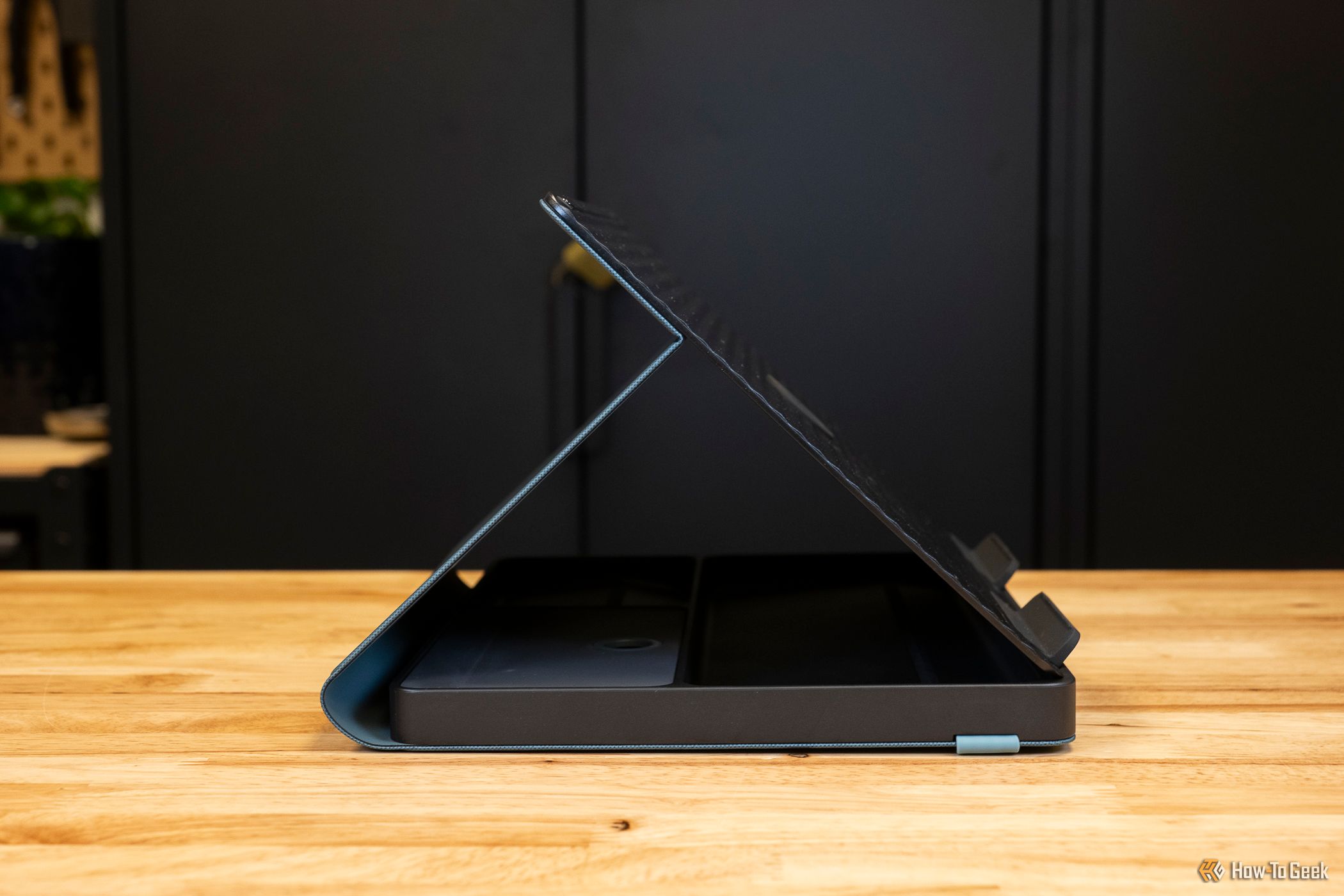
Jerome Thomas / How-To Geek
Finally, the stand felt a little flimsy when propped up. I was never seriously worried about it falling, but the concern was present. Even without a device on it, there was more flexing to it than I liked.
Mostly, I liked the case as a storage area. The keyboard and touchpad fit perfectly along with dedicated space for a cable or two and USB drives or small objects. It’s designed like a Moleskine which makes it easy enough to open and then keep securely closed.
Even though I was satisfied with the keyboard and touchpad, I often found myself trying to do mental gymnastics to figure out how much each part of this package costs. No matter how I spun it though, the pricing felt a little uneven. Even if the Keys was $75 and the Touch was $50 that leaves the case being $55 to get to the $180 retail total.
Despite liking the keyboard and thinking the touchpad was decent, I would be hard-pressed to want to spend $150 on both combined. And even $30 for the case in that pricing scenario seems high unless it’s used constantly, which I didn’t feel the need to do.
Should You Buy the Logitech Casa Pop-Up Desk?
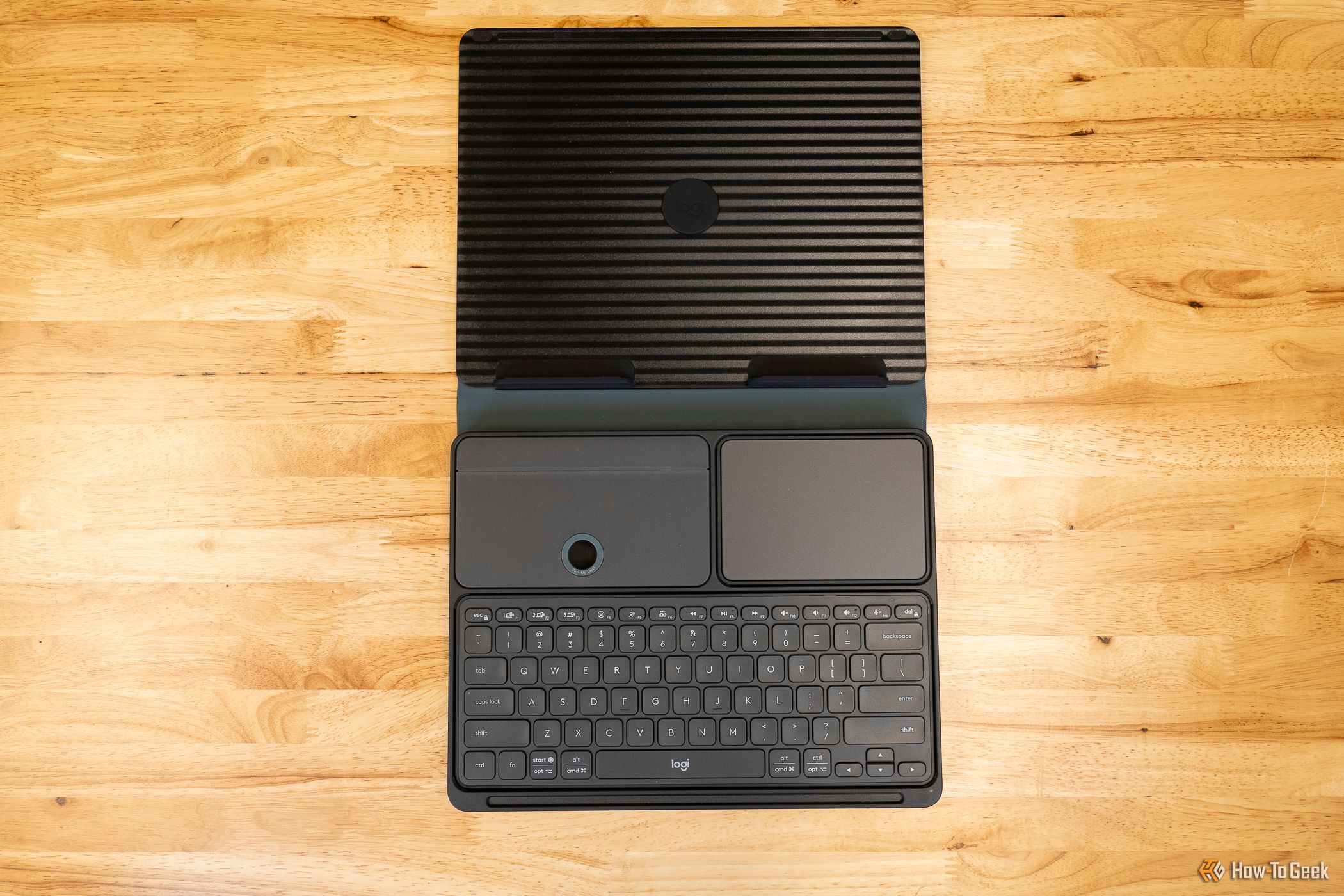
Tyler Hayes / How-To Geek
I’m a big fan of the Casa Keys, a moderate fan of the Casa Touch, and like the idea of the Pop-Up Desk, and yet, I’m still on the fence about the whole Logitech Casa Pop-Up Desk . The primary reason is the extra cost and weight added by the case stand.
I found the stand to be awkward to carry, unfold, and use in public. It’s not something suited to plane travel. I also wouldn’t want to carry travel with it for use in a hotel. I would caution people looking at this for on-the-go use. And to its credit, Logitech doesn’t really advertise it in this way.
The product is, however, much more apt for a portable workstation around your house or apartment. This whole thing could be tucked away on a bookcase each weekend if you really want to compartmentalize work and leisure. Overall, it’s a fine product with a skewed price. It’s best to try and find it on sale.

Logitech Casa Pop-Up Desk
6/ 10
$160 $180 Save $20
This all-in-one, ergonomic workspace includes a minimalist keyboard, intuitive wireless touchpad and convenient storage compartment nestled in a book-like case that transforms into a sturdy, foldaway laptop stand.
$160 at Amazon $179.99 at Logitech
Also read:
- [New] Premier Updates Facebook's Latest Gems Unearthed
- [Updated] Corrected Clandestine Miniature Video Absence for 2024
- [Updated] Expert Insights Into Synchronizing Desktops in Google Meet for 2024
- Boost Your Gaming Experience with the Latest AMD Drivers – Download & Install Now!
- Haunted Colleges and Universities | Free Book
- How To Transfer WhatsApp From iPhone 12 to other iPhone 15 Pro devices? | Dr.fone
- How to Unlock Asus ROG Phone 8 Pro Phone Forgot Password
- In 2024, Does Life360 Notify When You Log Out On Honor X50i? | Dr.fone
- In 2024, How Can I Use a Fake GPS Without Mock Location On ZTE Nubia Z60 Ultra? | Dr.fone
- New 2024 Approved Mask Tracking with Adobe Premiere Pro A Detailed Guide
- Possible solutions to restore deleted videos from Realme 10T 5G
- Reconstruction of Data on Laufwerk D with Windows 11 - Restore Your Files Now!
- Title: Evaluating the Logitech Casamania Pop Up Desk: Outstanding Keyboard and Trackpad Performance Overshadowed by Inferior Case Design
- Author: Vivienne
- Created at : 2024-12-05 17:28:03
- Updated at : 2024-12-11 18:42:42
- Link: https://review-topics.techidaily.com/evaluating-the-logitech-casamania-pop-up-desk-outstanding-keyboard-and-trackpad-performance-overshadowed-by-inferior-case-design/
- License: This work is licensed under CC BY-NC-SA 4.0.